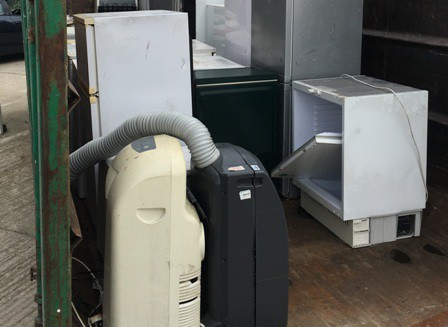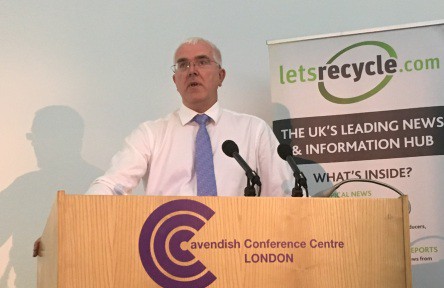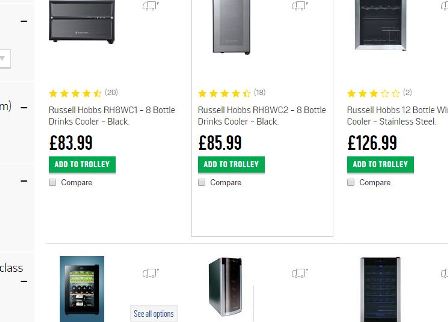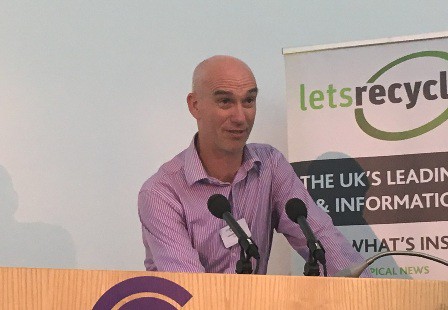Concerns were raised by some local authorities last week that waste electrical equipment – principally fridges that could be from the commercial sector – are not being collected by some producer compliance schemes (PCS).

Some councils are finding producer compliance schemes reluctant to take cooling equipment which might not count as household WEEE
The concerns were raised at the WEEE conference in London on 21 June organised by letsrecycle.com.
The topic was raised in the morning session when a panel of speakers was questioned by a local authority delegate over the issue of household and commercial fridges. She said that compliance schemes “seem to be not accepting fridges across the country.”
Responding, Chris Grove, environment and business senior advisor at the Environment Agency, said that the WEEE scheme forum and NAWDO were encouraging industry to set out guidelines over this. “From a local authority point of view you have to give some assurances that it has come from a household. Our view is that this will be best addressed by industry itself. As a regulator we can only comment on what the law is.”

EA official Chris Grove ‘encouraging industry to set out guidelines’
John Redmayne, general manager of the ERP compliance scheme looked to explain possible reasons why this might happen. He commented that “it may well be that some household producers don’t put commercial fridges on the market and so there are no payments to PCSs.
“It is those companies who are being asked to pay for companies who aren’t in the system. There is a mismatch over the definitions of obligated EEE when it is put on the market.”
Acceptance procedures
Defra official Graeme Vickery, senior policy advisor on WEEE, stepped in at this point and said: “We are aware of the issue – we are looking to resolve it. If we have to issue a statement we will. The definition of WEEE from private households is pretty clear. If a fridge is taken to a CA site by a householder, irrespective of type, it is household WEEE and the responsibility of the PCS (even if it looks like a commercial unit). But there is an onus on local authorities to have proper acceptance procedures for ‘common or garden’ fridges and to determine that items have actually come from the home.”

Mr Vickery has said that the fridges in the Argos catalogue are a good guide to what would count as household WEEE
But, he pointed out that there are obligations that sit in the regulations which obligated producers of commercial items. “It is clunky but there is the opportunity to collect the cost of dealing with that fridge from the producer or compliance scheme to which they belong.”
Corner shop
Chris Chandler, senior waste manager for Devon county council, remarked: “I struggle to see how it works. Who does the corner shop contact? It is very difficult for them to see what to do.”
Mr Chandler noted that small business owners could, for example, contact the fridge manufacturer but was likely to have to take the fridge for treatment and this could involve a long journey.
Earlier this month, Mr Vickery said at the National Civic Amenity Site conference that in effect all cooling appliances listed in the Argos catalogue, for example, should count as household fridges and be eligible for collection (see letsrecycle.com story).
The conference also discussed the situation facing some local authorities, such as happened in Devon, where no compliance scheme had wanted to collect WEEE from local authority sites.
Delegates were reminded by Mr Vickery that Regulation 34, was there to provide “a backstop for councils who had no PCS scheme”.

Graeme Vickery of Defra who signalled that mandatory membership of the PBS may be on the cards
Essentially, the regulation means that a local authority can call an organisation, set up by most compliance schemes, known as the PBS or Producer Balancing System, and then a PCS will be appointed to collect the WEEE from the local authority concerned.
“This year”, explained Mr Vickery, “we have seen some decline in the use of Regulation 34 with broadly speaking it currently being used by 22 waste disposal authorities for 45 particular WEEE streams.”
‘Mandatory’
And, responding to a question over whether all schemes were in membership of the PBS, Mr Vickery said that most PCS are in the balancing scheme, “well over 90% in terms of obligation”. The Defra official appeared to be close to warning schemes that weren’t in the PBS that they should consider joining it: “There is an argument that perhaps it should be made mandatory and we could make a change alongside the Open Scope amendments.”
Mr Vickery also revealed that more funding is to be made available to fund local WEEE recycling projects this summer. The money, which he indicated later is in the order of £365,000, will come from payments made into the compliance fee system for the 2016 compliance period. This is money “legitimately” paid by a PCS if it has not managed to obtain recycling evidence for a specific type of WEEE. The sum available is similar to that in 2014 and notably higher than in 2015.
Explaining more about the background of regulation 34, Richard Peagram, principal consultant with the Anthesis Group that runs the PBS, said that he had been in dialogue with local authorities and “they could call anybody” in the sense of any producer compliance scheme to ask them to collect the WEEE. When a call is made, he explained there is a mechanism that sees the work offered to all schemes.
Inflated
Some concerns about the PBS and its costs were raised by Matt Manning, compliance and recycling operations manager for Dixons Carphone. He said: “Costs seem highly inflated compared to traditional streams.” And he reasoned that councils weren’t happy with the systems and asked whether it might well be easier for councils to have a scheme given to them in the first place.
In response, Mr Peagram said that this need would require “a matching system to be prescribed in legislation”.
The post Councils seek assurances over ‘commercial’ fridges appeared first on letsrecycle.com.
Source: letsrecycle.com Waste Managment


